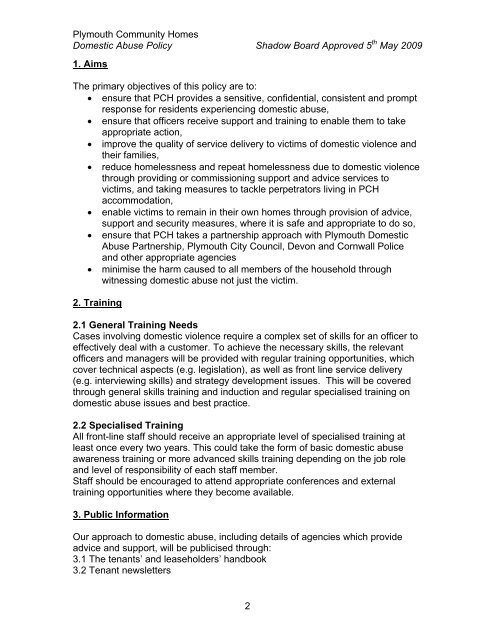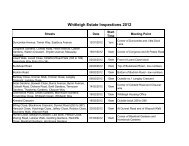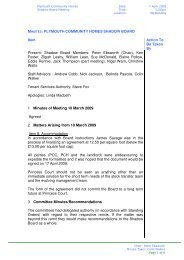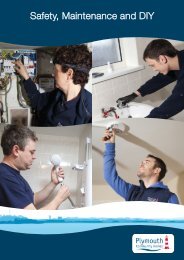Domestic Abuse Policy (41.6kb) - Plymouth Community Homes
Domestic Abuse Policy (41.6kb) - Plymouth Community Homes
Domestic Abuse Policy (41.6kb) - Plymouth Community Homes
Create successful ePaper yourself
Turn your PDF publications into a flip-book with our unique Google optimized e-Paper software.
<strong>Plymouth</strong> <strong>Community</strong> <strong>Homes</strong><br />
<strong>Domestic</strong> <strong>Abuse</strong> <strong>Policy</strong> Shadow Board Approved 5 th May 2009<br />
1. Aims<br />
The primary objectives of this policy are to:<br />
ensure that PCH provides a sensitive, confidential, consistent and prompt<br />
response for residents experiencing domestic abuse,<br />
ensure that officers receive support and training to enable them to take<br />
appropriate action,<br />
improve the quality of service delivery to victims of domestic violence and<br />
their families,<br />
reduce homelessness and repeat homelessness due to domestic violence<br />
through providing or commissioning support and advice services to<br />
victims, and taking measures to tackle perpetrators living in PCH<br />
accommodation,<br />
enable victims to remain in their own homes through provision of advice,<br />
support and security measures, where it is safe and appropriate to do so,<br />
ensure that PCH takes a partnership approach with <strong>Plymouth</strong> <strong>Domestic</strong><br />
<strong>Abuse</strong> Partnership, <strong>Plymouth</strong> City Council, Devon and Cornwall Police<br />
and other appropriate agencies<br />
minimise the harm caused to all members of the household through<br />
witnessing domestic abuse not just the victim.<br />
2. Training<br />
2.1 General Training Needs<br />
Cases involving domestic violence require a complex set of skills for an officer to<br />
effectively deal with a customer. To achieve the necessary skills, the relevant<br />
officers and managers will be provided with regular training opportunities, which<br />
cover technical aspects (e.g. legislation), as well as front line service delivery<br />
(e.g. interviewing skills) and strategy development issues. This will be covered<br />
through general skills training and induction and regular specialised training on<br />
domestic abuse issues and best practice.<br />
2.2 Specialised Training<br />
All front-line staff should receive an appropriate level of specialised training at<br />
least once every two years. This could take the form of basic domestic abuse<br />
awareness training or more advanced skills training depending on the job role<br />
and level of responsibility of each staff member.<br />
Staff should be encouraged to attend appropriate conferences and external<br />
training opportunities where they become available.<br />
3. Public Information<br />
Our approach to domestic abuse, including details of agencies which provide<br />
advice and support, will be publicised through:<br />
3.1 The tenants’ and leaseholders’ handbook<br />
3.2 Tenant newsletters<br />
2
















